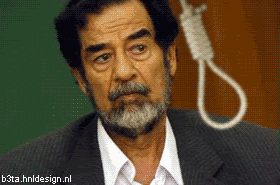The Truth, Part 2
Speak truth to power.
The phrase conjures visions of Old Testament patriarchs or civil rights prophets stepping forward in difficult times to utter unpopular, discomfiting truths.
Of course, the phrase loses its power when commonplace. There's nothing biblical or righteous about an MSNBC promo for an announcer who "speaks truth to power," or a senator asking at a confirmation hearing, "Will you speak truth to power?" That's just politics.
So it was encouraging to see a recent example of the real thing.
During a trip to Asia last month, Vice President Cheney, in an ABC News interview, said the troop withdrawal ideas promoted by some leading Democrats were similar to al-Qaeda's plans for Iraq:
"If we were to do what Speaker Pelosi and Congressman Murtha are suggesting, all we'll do is validate the al-Qaeda strategy. The al-Qaeda strategy is to break the will of the American people - in fact, knowing they can't win in a stand-up fight, try to persuade us to throw in the towel and come home, and then they win because we quit... .
"You can't look at Iraq in isolation. You've got to look at it in terms of its impact, what we're doing in Afghanistan, what we're doing in Pakistan, what we're doing in Saudi Arabia. All those areas are part of the global battlefield... and you can't quit in one place and then persuade all your allies who are helping you in all those other theaters... to continue the fight."
How does he know the enemy's intent? They tell us.
Here's Osama bin Laden in a 2004 audio message: "The most important and serious issue today for the whole world is this Third World War, which the Crusader-Zionist coalition began against the Islamic nation. It is raging in the land of the two rivers. The world's millstone and pillar is in Baghdad."
Bin Laden's right-hand man, Ayman al-Zawahiri, laid out a plan in a July 2005 letter: "The jihad in Iraq requires several incremental goals. The first stage: Expel the Americans from Iraq. The second stage: Establish an Islamic authority or emirate, then develop it and support it until it achieves the level of a caliphate - over as much territory as you can to spread its power in Iraq. The third stage: Extend the jihad wave to the secular countries neighboring Iraq. The fourth stage:... the clash with Israel, because Israel was established only to challenge any new Islamic entity."
So Cheney was speaking a simple truth: Al-Qaeda wants the United States out of Iraq. And congressional calls to give up, regardless of conditions on the ground or what happens next in the wider war, validate that strategy.
That doesn't mean there can be no dissent to current policy. A free society debates issues, and there are plenty of reasons offered to quit: War itself is a mistake. The initial invasion was a mistake. The occupation has been a series of mistakes. Refereeing a sectarian struggle that goes beyond fighting al-Qaeda is a mistake.
People will advocate as conscience dictates. All Cheney did was point out that advocacy doesn't occur in a vacuum.
House Speaker Nancy Pelosi (D., Calif.) called the vice president's remarks "beneath the dignity of the debate we're engaged in." Wrong. This is precisely the debate we should be engaged in. Everyone wants the war to end, to see the troops safely home. The question is how? Under what terms?
As U.S. leaders try to answer these questions, they can't pretend the discussion is an exchange of theories in a college seminar with no real-world implications. Words have meaning. They reassure allies and troops, or worry them. They dishearten enemies, or comfort them. If al-Qaeda's hopes for a precipitative U.S. withdrawal are echoed in congressional resolutions, that's got to be comforting. It may not be the intent, but it's the reality.
Pelosi said Cheney was questioning the "patriotism of those in Congress who challenge the Bush administration's misguided policies in Iraq."
Wrong again. And Cheney's reply was characteristically blunt and on target: "I didn't question her patriotism. I questioned her judgment."
There's reason to question many judgments when it comes to Iraq, but in this case Cheney is right. And he speaks from experience. He worked in the White House 32 years ago, for President Ford, when Southeast Asian allies were abandoned to their enemies. Millions were killed and displaced.
If that nightmare is replayed in Iraq, Pelosi and the anti-war powers will have to answer for the truths they've left unspoken.
Contact Kevin Ferris at 610-701-7629 or kf@phillynews.com.


























0 Comments:
Post a Comment
<< Home